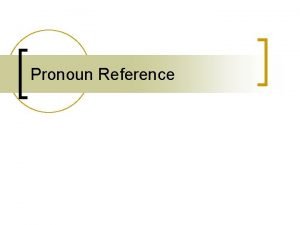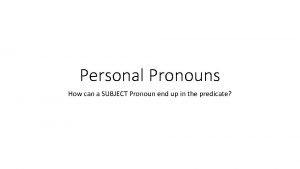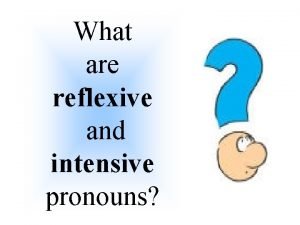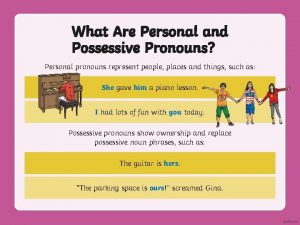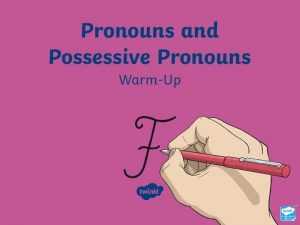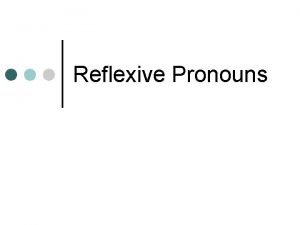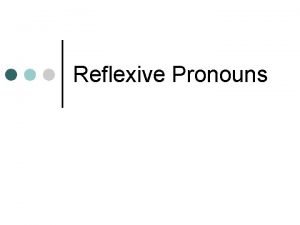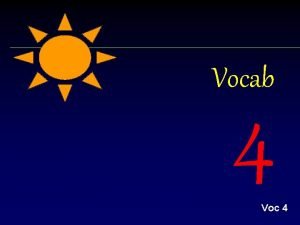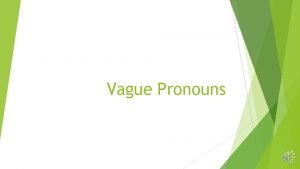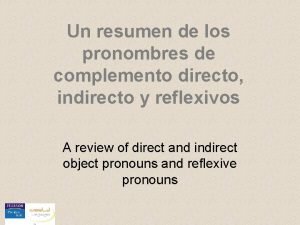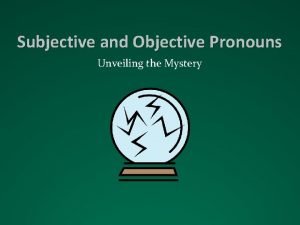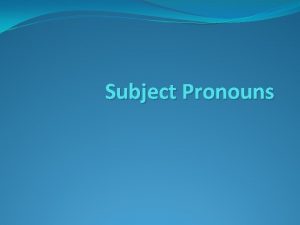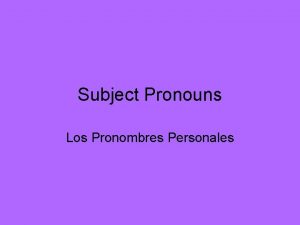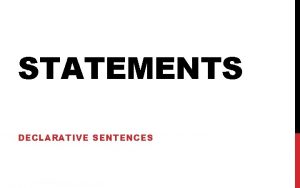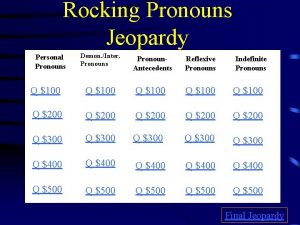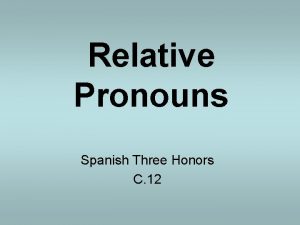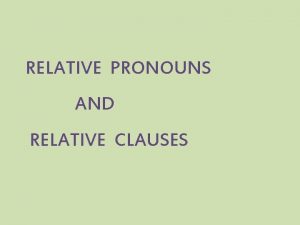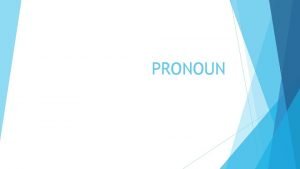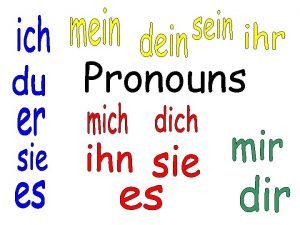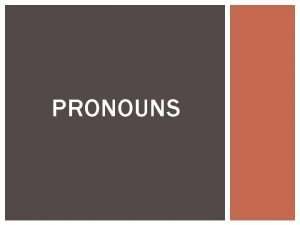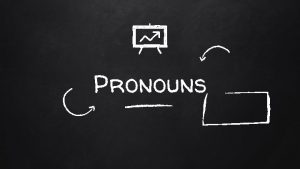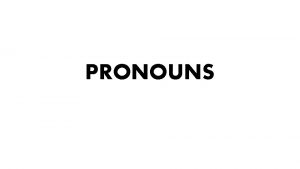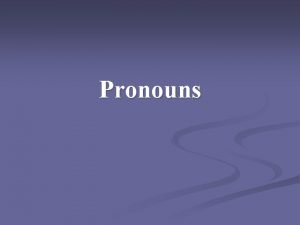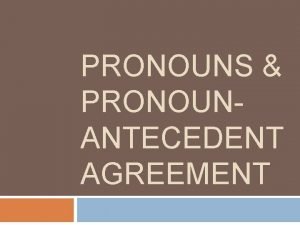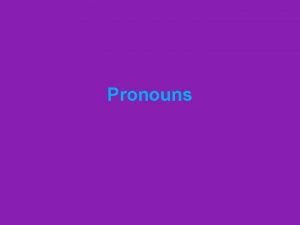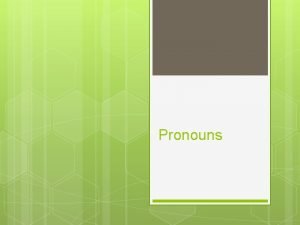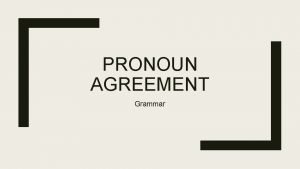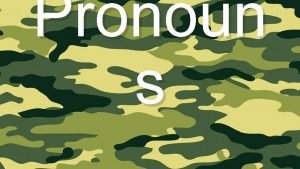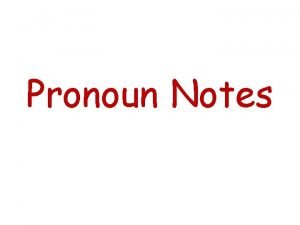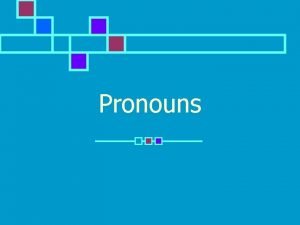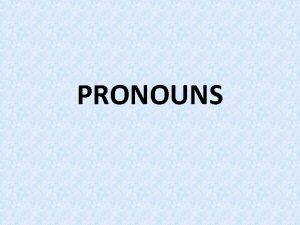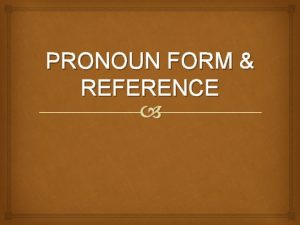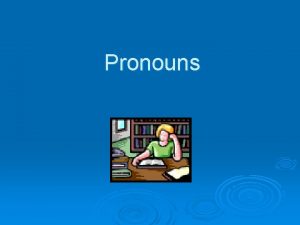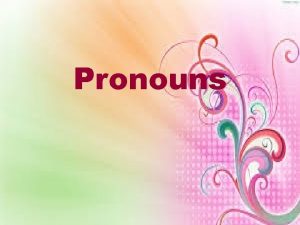Chapter 3 Pronouns What is a Pronoun A






























- Slides: 30

Chapter 3: Pronouns

What is a Pronoun? A pronoun takes the place of a noun. A pronoun can refer to a person, place, thing, or idea. The noun that a pronoun replaces or refers to is called its antecedent. Examples: Alexis is a great friend. She is so funny! Charlie reads his jokes to the class.

Personal Pronouns Personal pronouns refer to people or things. Personal pronouns must match or “agree” with their antecedents in three ways: Person: 1 st person, 2 nd person, 3 rd person P. O. V. Number: singular or plural Case: The “job” it does in the sentence

Personal Pronouns SUBJECT OBJECT POSSESSIVE Singular 1 st Person I me my, mine Singular 2 nd Person you your, yours Singular 3 rd Person he, she, it him, her, it his, hers, its Plural 1 st Person we us our, ours Plural 2 nd Person you your, yours Plural 3 rd Person they them their, theirs

Subject Pronouns Subject pronouns: I, you, he, she, it, we, you, they Use a subject pronoun to replace the subject of a sentence. Trisha went shoe shopping with her mom. She went shoe shopping with her mom. Use a subject pronoun to replace a predicate noun. The best player on the team is Jason. The best player on the team is he.

Subject Pronouns - Examples In the evenings, Jonathan likes to play solitaire. In the evenings, he likes to play solitaire. The best players on the team are Jon and Talia. The best players on the team are they. My brother, my sister, and I love to go swimming. We love to go swimming.

Subject Pronouns - Practice 1. Did ____ (Sarah) finish her social studies project? 2. ______ (Tom and Jerry) are cartoon characters that always fought with each other. 3. The winner of the spelling bee is _____ (George). 4. Every summer, ______ (mom and I) go to Great America. 5. The first people to get to school were _____ (Dan and Peter). 6. *Ring!* Hello? Yes, this is _____ (Alice).

Object Pronouns Object Pronouns: me, you, him, her, it, us, you, them Use an object pronoun to replace a direct object. Camille sang a song for her grandma at the party. Camille sang it for her grandma at the party. Use an object pronoun to replace an indirect object. Eventually, Fran told Dave and Carol the truth. Eventually, Fran told them the truth.

Object Pronouns Use an object pronoun to replace the object of a preposition. Homework is easy for Sam. Homework is easy for him. Would you like to ride with Mom, Dad, and me? Would you like to ride with us?

Object Pronouns - Examples The puppy chased the ball in the yard. The puppy chased it in the yard. Our teacher gave Isabel the graded test. Our teacher gave her the graded test. Can you keep the secret between you and (I/me)? Can you keep the secret between you and me?

Object Pronouns - Practice 1. Please take _____ (Tara and I) to the park. 2. The coach explained the rules to _____ (Lisa). 3. My parents gave ______ (the toddlers) candy. 4. Clint lent _____ (Jerrod) a DVD on the Korean War. 5. Clint Lent Jerrod a DVD on _____ (the Korean War). 6. The mysterious death of King Tut fascinates _____ (Kim and I). 7. The delicious cookie recipe stays between Mom and _____ (I/me).

Possessive Pronouns Possessive Pronouns: my, mine, yours, his, her, hers, its, ours, yours, theirs Possessive pronouns show ownership. Examples: There is Susan’s bike. There is her bike. (takes the place of Susan’s) Is Mike’s Play. Station the newest model? Is his Play. Station the newest model? (takes the place of Mike’s)

Possessive Pronouns vs. Contractions Some possessive pronouns and contractions are homophones (words that sound the same but are spelled differently). Know the difference! Possessive Pronouns (never have apostrophes) Contractions (always have apostrophes) their = belonging to they’re = they are its = belonging to it it’s = it is your = belonging to you’re = you are whose = belonging to who’s = who is

Possessive Pronouns - Examples Those books are Tom, Jerry, and Lisa’s Those books are theirs. The cat caught the cat’s paw in the fence. The cat caught its paw in the fence. Roger will mail the letter that belongs to me tomorrow. Roger will mail my letter tomorrow. My brother gave me my brother’s tickets to the show. My brother gave me his tickets to the show.

Possessive Pronouns - Practice 1. I took my phone, but Regina forgot _______ (Regina’s) at home. 2. The house should have ______ (the house’s) address displayed clearly. 3. ______ (Bob and Sue’s) new puppy is so adorable! 4. Soon, this will be ____(belonging to me) car. 5. Have you seen ____ (my family’s) new vacation home? 6. As long as it works, we will go with ______ (belonging to you) idea.

Possessive Pronouns vs. Contractions - Practice 1. She did not know (who’s, whose) mom had called. 2. The kitten licked (it’s, its) paws after eating tuna. 3. (Who’s, Whose) going to Amanda’s birthday party? 4. Will you let me copy (your, you’re) notes from yesterday? 5. The red one in the corner of the lot is (they’re, their) car. 6. (Its, It’s) the time of year when days get longer. 7. Stop goofing around; (you’re, your) being silly.

Reflexive and Intensive Pronouns that end in -self or –selves are either reflexive or intensive pronouns, depending on how they are used in a sentence. 1 st Person myself 2 nd Person yourself 3 rd Person herself, himself, itself ourselves yourselves themselves NOTE: hisself and theirselves are NOT real words. Don’t use them!

Reflexive Pronouns Reflexive pronouns reflect action back to the subject (like a mirror). They are necessary; if you take them out, the sentence changes. Examples: The winners considered themselves lucky. How do you prepare yourself for a game?

Intensive Pronouns Intensive pronouns emphasize a noun or another pronoun in the sentence. They are not necessary; if you take them out, the sentence means the same thing. Examples: The players themselves designed their uniforms. I myself will never forget the baseball player Sammy Sosa.

Practice 1. We bought ourselves pretzels at the fair. 2. My brother made himself some dinner. 3. I myself am tired of doing homework. 4. The president himself appeared at the rally. 5. The puppy saw itself in the mirror. 6. The queen herself gave the knight the award. 7. The police officers themselves witnessed the accident.

Demonstrative Pronouns Demonstrative pronouns: this, that, these, those They point out a person, place, or thing and are used alone in a sentence. Examples: This is my favorite pet. (correct - pronoun) This cat is my favorite pet. (incorrect - adjective) Those are delicious! (correct - pronoun) Those brownies are delicious! (incorrect - adjective)

Practice 1. ____ is an interesting story. (near) 2. Are ____ the books you’re looking for? (far) 3. Was ____ the movie the girls saw? (far) 4. I would like to borrow some of ____. (near) 5. ____ is the year we’ll win the championship! (near) 6. ____ were the best years of my life. (far)

Interrogative Pronouns Interrogative pronouns: who, whom, what, which, whose They are used to introduce a question. Examples: Who has an animal for a friend? What do you like best about animals? Whose was left in the classroom? Which do you like best?

Who vs. Whom Who is always used as a subject or predicate noun. Who gave you the notes from class? (subject) The person that finished first was who? (predicate noun) Whom is always used as a direct object, indirect object, or object of a preposition Whom did you ask about the field trip? (direct object) You gave whom a hug? (indirect object) From whom did you borrow it? (object of a preposition)

Who vs. Whom Here are some tricks to help you choose between who and whom: 1. Rewrite the question as a statement. Did you see (who, whom) at the store? You did see (who, whom) at the store. 2. Decide if the pronoun is a subject or an object. You did see whom at the store. (direct object)

Practice (Fill in the blank with what, which, or whose) 1. _____ is your goldfish’s name? 2. _____ Super Bowl party are we attending this year? 3. _____ of the Harry Potter movies is your favorite? 4. Do you know _____ essay was turned in late? 5. _____ of the candidates will most likely win? 6. _____ is Paul having for dinner? 7. _____ will happen next?

More Practice (Fill in the blanks with who or whom) 1. For _____ are you baking the cookies? 2. _____ did you meet at the library? 3. _____ told Ben the password? 4. You gave the party decorations to _____ ? 5. _____ are you looking for? 6. The small girl with the red hair is _____ ? 7. _____ is the small girl with the red hair?

Indefinite Pronouns Indefinite pronouns refer to an unspecified person, place, thing, or idea. They don’t have antecedents. Examples: Everyone knows about the Titanic. Anybody would be amazed by the story. Many shared their feelings about the disaster.

Indefinite Pronouns Chart Singular everybody everyone everything anybody anyone anything somebody someone something another each either nobody no one nothing one Plural both few many several Singular OR Plural all most any none some

Indefinite Pronouns Practice 1. Both of the kids want (his or her, their) toys. 2. Anyone in trouble depends on (his or her, their) friends. 3. Neither of the men looks as if (he, they) wants the job. 4. Many want to get good grades on (his or her, their) report card. 5. Everybody turns in (his or her, their) permission slip today. 6. Several made (his or her, their) parents very happy. 7. Each of the students needs to give (his or her, their) answer 8. A few of the jurors were voicing (his or her, their) opinions.
 Personal pronoun
Personal pronoun Subject and object
Subject and object Interrogative and relative pronoun
Interrogative and relative pronoun The oozes pronouns
The oozes pronouns Indefinite pronouns examples in sentences
Indefinite pronouns examples in sentences Intensive and reflexive pronouns
Intensive and reflexive pronouns Personal possessive pronouns
Personal possessive pronouns Match the possessive below
Match the possessive below Function of
Function of Interrogative adjectives and pronouns
Interrogative adjectives and pronouns Imperative senteces
Imperative senteces Object pronouns and reflexive pronouns
Object pronouns and reflexive pronouns Subject pronouns atividades
Subject pronouns atividades Vague antecedent
Vague antecedent Cow verb
Cow verb Vague pronouns examples
Vague pronouns examples Antecedent agreement
Antecedent agreement Is a a pronoun
Is a a pronoun Que es modificador directo
Que es modificador directo Thou thee thy thine
Thou thee thy thine Singular pronouns in spanish
Singular pronouns in spanish Singular subject pronouns
Singular subject pronouns Subject pronoun definition
Subject pronoun definition Sanam pronouns
Sanam pronouns Declarative pronouns
Declarative pronouns Reflexive verbs spanish examples
Reflexive verbs spanish examples Pronoun demon
Pronoun demon Suitable relative pronouns
Suitable relative pronouns Relative pronouns in spanish
Relative pronouns in spanish Relative clause
Relative clause Relative clauses jeopardy
Relative clauses jeopardy
